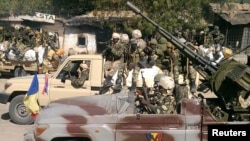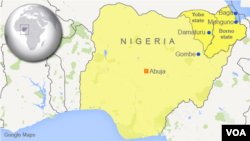South African and other foreign soldiers in Nigeria are fighting against Boko Haram, engaging in ground combat and flying combat air sorties, Nigerian soldiers told VOA Thursday.
The fighting comes as the Nigerian government tries to notch battlefield victories ahead of presidential and parliamentary elections later this month.
Nigerian government officials confirmed the presence of foreign military personnel, but said they were only advisers accompanying military equipment purchased from South Africa, Russia and Ukraine.
Nigerian President Goodluck Jonathan told VOA in an interview Wednesday that the foreigners were "technicians" brought in for maintenance and instruction.
But Nigerian soldiers disputed that the foreigners were only present as advisers, telling VOA Thursday that many of the soldiers were participating in actual combat.
Critical presence
The decision to bring private military contractors to the fight is a critical one for the government of Jonathan, who is locked in a tight election campaign against Muhummadu Buhari.
While the government has allowed forces from Niger and Chad to make incursions into Nigerian territory to fight Boko Haram, the presence of soldiers from outside the region — South African or Eastern European — calls into question the effectiveness of the Jonathan administration’s fight against the militants.
Boko Haram’s chaotic and bloody insurgency has killed thousands and displaced more than 1 million people in northern Nigeria.
One soldier, who is living alongside the foreign personnel in a barracks in the city of Maiduguri, identified the foreigners as South Africans, Ukrainians and others. He said they were flying aircraft from the Maiduguri airport.
"The South Africans don’t want to deploy with any Nigerian military units, they want to go on their own," the sergeant, who was not authorized to speak to the media, told VOA.
Another soldier, a corporal, told VOA that Nigerian and foreign soldiers had been massing near the town of Bama earlier this week for a planned offensive.
But miscommunication resulted in Nigerian soldiers opening fire on two armored personnel carriers driven by "white soldiers," thinking the vehicles were operated by Boko Haram, the soldier said. One of the drivers was killed in the shooting, and the offensive was then called off.
Earlier this week, news reports said a South African ex-soldier who was working as private military contractor was killed in the northeast. It was unclear if that death came in the same incident.
A representative from South Africa's Department of International Relations and Cooperation declined to comment on the report.
"The white soldiers, they were the only ones who knew how to operate the mobile rocket launchers," the corporal said.
The corporal, who was also based in the barracks in Maiduguri, said South African pilots had been flying combat missions using Nigerian jets, surveillance planes and helicopters, along with jets he said appeared to be South African.
"All the aerial attacks are being done by the white soldiers using Nigerian and hired military aircraft," he said.
Another officer, who served as a top aide to the commander of a brigade in Borno state, told VOA there were between 100 and 150 foreign soldiers, mainly South African, working out of Maiduguri and they were flying fighter jets daily out of the Maiduguri airport.
On February 27, a VOA reporter witnessed a convoy of around 30 vehicles— armored personnel carriers, mine sweepers and open-backed troop transport trucks — driving north on the main highway between the capital Abuja and Maiduguri.
The drivers were white and men visible in the backs of the transport trucks were overwhelmingly white. Some of the trucks had what appeared to be Nigerian flags painted on the doors.
Election issue
Jonathan is facing a tough re-election challenge from Buhari, a former military officer who headed the country during a period of military rule in the 1980s.
The election had been scheduled for last month but with the Nigerian security forces unable to quell the fighting, security concerns became a top campaign issue and officials postponed the vote until March 28.
In recent weeks, the Nigerian government has claimed new momentum against Boko Haram. Neighboring Chad, Cameroon and Niger have also stepped up their campaigns, targeting militant fighters and camps along the borders with Nigeria.
Jonathan interview
In Abuja Thursday, the Nigerian government official, who also spoke on condition of anonymity, told VOA that Nigeria had bought new tanks, trucks, bridge-building equipment and aircraft. He said the foreigners were armed and working in Maiduguri.
"So we now have this technical people who are trainers and technicians, who are to train our people on how to use them, and technicians that help the maintenance, at the same time training our people how to maintain this equipment," Jonathan told VOA in the interview broadcast Wednesday.
Lulu Mnguni, South Africa’s ambassador to Nigeria, said he was unaware of recent private arms sales to Nigeria, but said the South African government has sold Nigeria weapons in the past.
South Africa’s defense minister said in January that if mercenaries or private military contractors were to go to Nigeria, they would be prosecuted under South African law upon returning.
David Zounmenou, a senior research fellow at the South Africa-based Institute for Security Studies, said the fact that Nigeria ended up employing private contractors, even in a training capacity, shows the sensitivities of having foreign troops on Nigerian soil.
"I think it’s more discrete to rely on private military companies to do the job than to get involved in any official agreement assistance that may also have political implications ahead of the upcoming president elections," he said.
But Zounmenou warned the deployment could strain Jonathan’s relationship with the military.
"There are some competent minds within that establishment. If they are given the opportunity and the resources, they could do the job. I think we still have some good units within the Nigerian army," he said. "And if they are pulled aside and government relies on foreign troops to do the job, I think that will not really be well-taken."
Since erupting in 2009, the insurgency has morphed into what often seems like a full-scale guerilla war, with suicide bombings, hit-and-run ambushes and civilians caught in the cross-fire.
Human rights and civil society groups have accused the Nigerian military of worsening the situation with gross rights violations that have alienated the population in the northeast.
Last fall, VOA documented evidence of Nigerian security officers executing suspected Boko Haram sympathizers.
Stein reported from Abuja. Eckel reported from Washington. A VOA correspondent in Nigeria contributed to this report.





